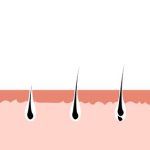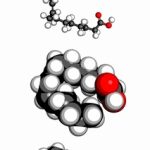1. Understanding the Hair Growth Cycle
To understand how hair growth supplements work, its important to first learn about the natural hair growth cycle. Your hair goes through three main phases: anagen, catagen, and telogen. Each phase plays a crucial role in determining hair health, growth rate, and shedding.
Anagen Phase: The Growth Stage
The anagen phase is when your hair actively grows. This stage can last anywhere from two to seven years, depending on genetics and overall health. The longer this phase lasts, the longer your hair can grow.
Catagen Phase: The Transition Stage
The catagen phase is a short transitional period that lasts about two weeks. During this time, hair follicles shrink, and growth slows down as they prepare to enter the resting stage.
Telogen Phase: The Resting Stage
The telogen phase lasts around three months. During this time, old hairs remain in place while new hairs start forming beneath them. Eventually, the old hairs shed, making way for fresh growth.
Hair Growth Cycle Overview
| Phase | Description | Duration |
|---|---|---|
| Anagen | Active growth phase where hair lengthens | 2-7 years |
| Catagen | Transition phase where follicles shrink | Around 2 weeks |
| Telogen | Resting phase before shedding occurs | Around 3 months |
How the Hair Growth Cycle Affects Shedding and Thickness
If more hairs are in the telogen phase than usual, you may experience excessive shedding or thinning. Factors like stress, poor nutrition, and hormonal imbalances can shorten the anagen phase and push more hairs into telogen prematurely. This is where hair growth supplements claim to help—by providing essential nutrients to support a longer anagen phase and reduce excessive shedding.
2. Key Ingredients in Hair Growth Supplements
Hair growth supplements often contain a mix of vitamins, minerals, and plant-based extracts designed to support healthy hair. But do these ingredients really work? Let’s take a closer look at some of the most common ones and their roles in hair health.
Biotin: The Hair Vitamin
Biotin, also known as vitamin B7, is one of the most popular ingredients in hair growth supplements. It helps convert nutrients into energy and plays a key role in keratin production, which is essential for strong hair.
How Biotin Supports Hair Growth
- Helps strengthen hair strands
- May reduce hair breakage
- Supports overall scalp health
Collagen: Building Block for Stronger Hair
Collagen is a protein that provides structure to your skin, nails, and hair. As we age, collagen production decreases, which can lead to weaker hair.
Benefits of Collagen for Hair
- Provides amino acids needed for hair growth
- Supports scalp health by improving skin elasticity
- May help reduce hair thinning over time
Saw Palmetto: Natural DHT Blocker
Saw palmetto is a plant extract that may help prevent hair loss by blocking dihydrotestosterone (DHT), a hormone linked to male and female pattern baldness.
How Saw Palmetto Works
- May reduce DHT levels in the scalp
- Could slow down hair thinning
- Might support fuller, healthier hair growth
Essential Vitamins for Hair Health
Hair growth supplements often include a variety of vitamins that play a role in maintaining strong and healthy hair. Here’s how they help:
| Vitamin | Role in Hair Growth |
|---|---|
| Vitamin A | Helps produce sebum to keep the scalp moisturized |
| Vitamin C | Aids collagen production and protects against oxidative stress |
| Vitamin D | May help stimulate new hair follicles |
| Vitamin E | Improves blood circulation to the scalp for better growth |
| B Vitamins (B6, B12) | Support red blood cell production, delivering oxygen to hair follicles |
| Zinc | Aids tissue repair and helps prevent hair shedding |
| Iron | Nourishes follicles by supporting oxygen flow through the bloodstream |
While these ingredients are commonly found in hair growth supplements, results can vary depending on individual health conditions, diet, and lifestyle factors. Understanding how each ingredient works can help you choose the right supplement for your needs.
![]()
3. Scientific Evidence: Do Hair Supplements Really Work?
With so many hair growth supplements on the market, it’s natural to wonder if they actually deliver results. To find out, we’ll analyze clinical studies and expert opinions to determine whether these supplements have measurable effects.
What Does Science Say About Hair Growth Supplements?
Several clinical studies have examined the effectiveness of hair growth supplements, with varying results. Some ingredients, like biotin and collagen, have been widely studied, while others have limited research backing their claims.
Key Ingredients and Their Scientific Support
| Ingredient | Scientific Evidence |
|---|---|
| Biotin | Some studies suggest biotin deficiency can lead to hair thinning, but there is limited evidence that supplementation helps those without a deficiency. |
| Collagen | Aids in overall hair health by providing amino acids needed for keratin production, though direct effects on hair growth are still being studied. |
| Saw Palmetto | May help block DHT, a hormone linked to hair loss, but more large-scale studies are needed. |
| Zinc & Iron | Nutrient deficiencies in zinc or iron are linked to hair loss, and supplementation may help restore hair growth in deficient individuals. |
Expert Opinions on Hair Growth Supplements
Dermatologists and trichologists generally agree that while certain vitamins and minerals support healthy hair, they aren’t a miracle cure for hair loss. Experts recommend addressing underlying causes such as genetics, hormonal imbalances, or medical conditions before relying solely on supplements.
The Importance of a Holistic Approach
A balanced diet, proper scalp care, and medical treatments (if necessary) should be combined with supplements for the best results. Hair supplements work best when used as part of a comprehensive approach rather than a standalone solution.
4. Factors That Influence Hair Growth Beyond Supplements
While hair growth supplements can provide essential nutrients to support healthier hair, several external factors also play a significant role in how your hair grows. Understanding these factors can help you take a more holistic approach to improving hair health.
Genetics: The Blueprint of Your Hair
Your genetic makeup has a major impact on your hair’s growth cycle, texture, thickness, and even its likelihood of thinning over time. If hair loss runs in your family, you may be more prone to experiencing it as well. While you cant change your genetics, being aware of your predispositions can help you take proactive steps to maintain healthy hair.
Diet: Fueling Hair from Within
The foods you eat play a crucial role in hair growth and overall scalp health. A diet rich in vitamins, minerals, and proteins supports stronger and healthier strands. Here’s a quick look at some essential nutrients for hair growth:
| Nutrient | Role in Hair Growth | Food Sources |
|---|---|---|
| Biotin (Vitamin B7) | Supports keratin production for stronger hair | Eggs, nuts, whole grains |
| Iron | Aids oxygen transport to hair follicles | Spinach, red meat, lentils |
| Zinc | Helps with tissue repair and hair follicle function | Pumpkin seeds, chickpeas, shellfish |
| Omega-3 Fatty Acids | Nourishes the scalp and promotes shine | Salmon, flaxseeds, walnuts |
| Vitamin D | Affects hair follicle cycling and regrowth | Mushrooms, fortified dairy products, sunlight exposure |
Stress: A Hidden Culprit Behind Hair Loss
If youve ever noticed increased shedding during stressful periods, youre not alone. Chronic stress can push hair follicles into the resting phase (telogen), leading to excessive shedding—a condition known as telogen effluvium. Managing stress through activities like meditation, exercise, and quality sleep can help minimize its impact on your hair.
Hormonal Changes: A Key Player in Hair Health
Your hormones significantly influence your hairs growth cycle. Fluctuations due to pregnancy, menopause, thyroid disorders, or medical conditions like polycystic ovary syndrome (PCOS) can lead to thinning or excessive shedding. If you suspect hormonal imbalances are affecting your hair health, consulting a healthcare professional can help determine appropriate treatment options.
The Bigger Picture: A Holistic Approach to Hair Care
No single factor determines the health of your hair—its a combination of genetics, nutrition, stress levels, and hormonal balance. While supplements can fill nutritional gaps, addressing these external factors is just as important for maintaining strong and vibrant locks.
5. Choosing the Right Supplement: What to Look For
With so many hair growth supplements on the market, it can be overwhelming to choose the right one. Not all supplements are created equal, and understanding what to look for can help you make an informed decision. Here’s a guide to selecting an effective hair growth supplement.
Key Ingredients to Look For
The best hair growth supplements contain scientifically backed ingredients that support hair health. Here are some key components:
| Ingredient | Benefits for Hair Growth |
|---|---|
| Biotin (Vitamin B7) | Supports keratin production and strengthens hair strands. |
| Collagen | Provides essential amino acids for hair structure and elasticity. |
| Zinc | Aids in hair tissue growth and repair while keeping oil glands healthy. |
| Iron | Essential for red blood cells to carry oxygen to hair follicles. |
| Saw Palmetto | Might help block DHT, a hormone linked to hair loss. |
| Vitamin D | A deficiency is often linked to hair thinning and shedding. |
| Amino Acids | The building blocks of proteins like keratin, crucial for strong hair. |
The Importance of Quality and Dosage
The effectiveness of a supplement depends on its quality and the correct dosage. Consider these factors when choosing a product:
- Pureness: Look for third-party tested supplements to ensure they don’t contain harmful additives or contaminants.
- Dosing: Check if the supplement provides clinically recommended dosages of key ingredients. Some products contain too little of the active ingredient to be effective.
- Bioavailability: Some forms of vitamins and minerals are more easily absorbed by the body than others. For example, iron in ferrous bisglycinate form is better absorbed than other types.
- No Fillers or Artificial Additives: Avoid supplements with unnecessary fillers, artificial colors, or preservatives that may do more harm than good.
Red Flags to Avoid
Avoiding low-quality or misleading products is just as important as finding the right one. Watch out for these warning signs:
- “Miracle” Claims: Be wary of supplements promising instant results—hair growth takes time and consistency.
- Lack of Transparency: Companies should disclose all ingredients and their dosages. If a brand hides this information, its a red flag.
- No Scientific Backing: A reputable supplement should have some scientific studies or clinical trials supporting its formula.
- Poor Reviews or Complaints: Check customer reviews and Better Business Bureau (BBB) ratings to see if users report negative side effects or lack of effectiveness.
- No Third-Party Testing: Supplements should be tested by independent labs to verify their purity and potency.
The Bottom Line on Choosing a Hair Growth Supplement
Selecting the right hair growth supplement requires careful consideration of ingredients, quality, and potential red flags. By focusing on well-researched nutrients, ensuring proper dosages, and avoiding misleading claims, you can increase your chances of finding an effective product that truly supports healthier, stronger hair.


